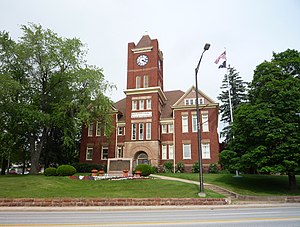The Iron Mountain Micropolitan Statistical Area, as defined by the United States Census Bureau, is an area consisting of two counties – one in Michigan and one in Wisconsin – anchored by the city of Iron Mountain, Michigan. As of the 2000 census, the μSA had a population of 32,560 (though a July 1, 2009 estimate placed the population at 31,245).[1]
Marinette–Iron Mountain, WI–MI Area | |
|---|---|
 Dickinson County Courthouse and Jail | |
 | |
| Country | |
| State | |
| Largest city | Marinette, WI |
| Other city | Iron Mountain, MI |
| Time zone | UTC−06:00 (CST) |
| • Summer (DST) | UTC−05:00 (CDT) |
Counties
editCommunities
editCities
edit- Iron Mountain, Michigan (Principal city)
- Kingsford, Michigan
- Norway, Michigan
Census-designated places
editNote: All census-designated places are unincorporated.
Unincorporated places
edit- Alfred, Michigan
- Channing, Michigan
- East Kingsford, Michigan
- Felch, Michigan
- Felch Mountain, Michigan
- Floodwood, Michigan
- Foster City, Michigan
- Granite Bluff, Michigan
- Hardwood, Michigan
- Hylas, Michigan
- Loretto, Michigan
- Merriman, Michigan
- Metropolitan, Michigan
- Ralph, Michigan
- Randville, Michigan
- Sagola, Michigan
- Skidmore, Michigan
- Spread Eagle, Wisconsin
- Theodore, Michigan
- Vulcan, Michigan
- Waucedah, Michigan
Townships/Towns
editDickinson County Townships
editFlorence County Towns
editDemographics
editAs of the census[2] of 2000, there were 32,560 people, 13,519 households, and 9,024 families residing within the μSA. The racial makeup of the μSA was 97.99% White, 0.12% African American, 0.50% Native American, 0.38% Asian, 0.03% Pacific Islander, 0.14% from other races, and 0.84% from two or more races. Hispanic or Latino of any race were 0.64% of the population.
The median income for a household in the μSA was $34,788, and the median income for a family was $41,931. Males had a median income of $33,682 versus $21,725 for females. The per capita income for the μSA was $21,725.
See also
editReferences
edit- ^ "Table 1. Annual Estimates of the Population of Metropolitan and Micropolitan Statistical Areas: April 1, 2000 to July 1, 2009 (CBSA-EST2009-01)". 2009 Population Estimates. United States Census Bureau, Population Division. 2010-03-23. Archived from the original (CSV) on June 15, 2010. Retrieved 2010-03-25.
- ^ "U.S. Census website". United States Census Bureau. Retrieved 2008-01-31.